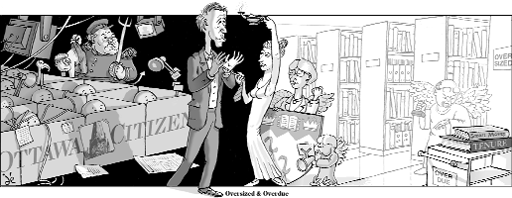
My first meeting in the private sector was a shock. It was January 1997. I was in the first few weeks of what became 21 months as the editorial pages editor of Conrad Black's Ottawa Citizen. I had taken a leave from McGill's Department of Economics, where I'd taught for 20 years. As mid-life crises go, it was less dangerous than a blonde. Besides, I already had a blonde, the long-suffering mother of my two children.
I don't remember the meeting's exact subject, but eight or so section heads were there, and we talked for an hour. As someone who'd had more than his share of university meetings, I expected we'd divide into subcommittees, write a couple of reports, and then finally come to some sort of compromise. But, no. At the end of an hour, the paper's editor, Neil Reynolds, said simply, "Let's try it this way."
Excuse me?
After a time, he mainly did away with meetings. Everyone was too busy. If you got eight people together for an hour, he reasoned, that used up an entire person-day. If you had a problem, you could take it to him directly. If you wanted advice, you could consult whomever you pleased. But meetings? Unh-uh.
Things happen fast in the newspaper business. Two days before a major makeover of the paper went into effect in March 1997, we noticed that our new editorial page layout, with headlines running at two lines, didn't allow us the kind of short and edgy -- and I'm afraid, at times overly cryptic -- heads that we hoped would make readers curious. So, with time running out, we simply compressed the space. The designer rolled his eyes and bit his tongue, but tighter heads generally worked better, even if, as a result of our last-minute switch, the visual effect was slightly off.
In the university, by contrast, time often seems unlimited and, as everyone has tenure, debates can go on forever. At a newspaper you're always on deadline -- the Citizen published seven days a week, 363 days a year, taking off only Christmas and New Year's -- and the spectre of empty pages forces teamwork. Structures are genuinely hierarchical: someone gets to say this or that goes, but there's also great co-operation, regardless of rank, that occurs more or less spontaneously as people step forward with ideas. Many was the time that my chief layout man, who happened also to be the union president, found the trick that helped save a page or fill a gap.

In its essence, of course, newspapering is an insane enterprise, trying to produce an entirely new product every 24 hours. Providing daily editorial comment is hardly less crazed. In my first year at the Citizen, we produced more than 1,100 editorials, albeit many of them only two or three column-inches long -- and most of us on the editorial board also wrote at least one column a week. If you can't write quickly -- a skill I had developed over 15 years of column-writing for the Financial Post and the Montreal Gazette -- you're dead. In fact, the great fun of being an editorial page editor is that, with all that space to fill, you can write on any length on any subject virtually any time you want to.
The drawback, of course, is that there are times when you don't have much to say, but the beast, as they call it, still has to be fed. Necessity breeds invention more times than not. In retrospect, some of my sharpest pieces were written at 6 o'clock on a Friday when a six-inch hole in Monday's ed stack had to be filled. (Never call editors on a Friday, by the way: Saturday, Sunday and Monday's papers have to be finished. They have no time for chat.)
The disadvantage of writing so much and so quickly is that, no matter how hard you try, error creeps in. Fatalism is obligatory. Earl Weaver, the manager of the Baltimore Orioles, once told an over-eager rookie reporter, "Kid, we play every day." It's the same in the newspaper business: you try to learn from your mistakes, but you can't dwell on them.
Camaraderie. Excitement. Authority. An audience in the nation's capital. Why did I give it all up to return to McGill? Three degrees of freedom. Freedom to structure time, especially family time. Freedom from quite so many deadlines. And freedom to say whatever I want. The Citizen gave me a remarkably free hand in devising its editorial policy, but a tenured university professor -- almost uniquely in this society -- is beholden to no one but himself.
The pity is so few of us take advantage of it. Too busy meeting, I suppose.
William Watson is an Associate Professor of Economics. Last October he returned to McGill and to the Institute for Research on Public Policy, where he edits Policy Options. His latest book, Globalization and the Meaning of Canadian Life (University of Toronto Press), was finished before he joined the Citizen and, in true academic rhythm, published after he left.
|